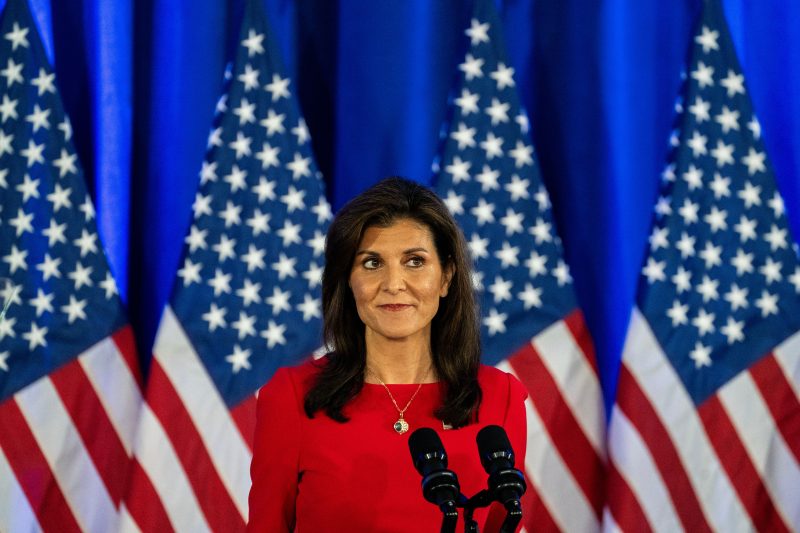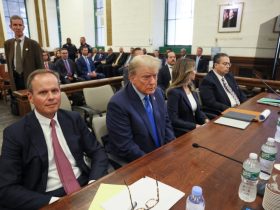President Biden’s reelection campaign launched a digital ad Friday aimed at supporters of Nikki Haley, who dropped out of the race for the Republican presidential nomination this month, part of a broader effort by Biden’s team to win over Republicans who may be disinclined to vote for Donald Trump.
The Biden campaign, which is spending more than $1 million on the ad across digital platforms, will run the spot for three weeks in battleground states, campaign officials said. It is part of a six-week, $30 million ad buy the campaign launched after the president’s March 7 State of the Union address.
The ad features clips of Trump denigrating Haley during campaign rallies and telling reporters that he does not need her supporters to win.
“If you voted for Nikki Haley, Donald Trump doesn’t want your vote,” the ad says. “Save America. Join us.”
Since Haley’s exit, the Biden campaign has regularly made overtures to her supporters and donors.
“Nikki Haley was willing to speak the truth about Trump: about the chaos that always follows him, about his inability to see right from wrong, about his cowering before Vladimir Putin,” Biden said in a statement when Haley ended her campaign. “Donald Trump made it clear he doesn’t want Nikki Haley’s supporters. I want to be clear: There is a place for them in my campaign.”
A Biden campaign official said Jeffrey Katzenberg and Rufus Gifford, who oversee fundraising for the president’s campaign, have held meetings with people in Haley’s orbit to try to recruit them. Biden allies are discussing a fundraiser specifically for Haley supporters in the coming weeks or months, said the official, who spoke on the condition of anonymity to discuss internal strategy.
The new ad will run across digital platforms, including Meta, YouTube, connected TV and online video. The Biden campaign’s analytics department has used election results in specific states to find likely Haley voters. Using Zip codes where Haley overperformed against Trump relative to her statewide total, the campaign will target voters who are slightly older, college-educated and more suburban.
Haley has not yet endorsed a candidate in the presidential race. But toward the end of her campaign, she became increasingly critical of Trump, whose administration she worked in as ambassador to the United Nations. A spokesperson for Haley did not respond to a request for comment.
During the GOP primary campaign, Trump wrote on his social media platform that Haley supporters “will be permanently banned from the MAGA camp.” After Haley dropped out, Trump wrote on Truth Social that he wanted “to invite all of the Haley supporters to join the greatest movement in the history of our Nation.” But in subsequent comments, when asked how he would win over Haley voters, Trump said, “I’m not sure we need too many.”
In her speech exiting the race, Haley said Trump had to earn the votes of her supporters. People close to Haley said he has made no effort to do so.
“Donald Trump, my sister made a plea to you to reach out to her voters and her movement and you have not done that. Shame on you. You will need them,” Haley’s brother, Mitti Randhawa, wrote on X. “He hasn’t done that. What a pathetic piece of.”
Some Haley supporters said they are skeptical that Biden’s ad will move many of her voters, noting that most of them are Republicans whose policy views are much more in line with Trump’s outlook, even if they dislike his style.
“Tone is definitely one of the things that was important to Nikki voters, so I’d say that it’s a potential entree to them, but I mean — the problem Biden people have is that, if anything, they’re entering a general election turning to the left,” a Republican strategist close to Haley’s camp said.
The strategist cited Biden’s recent comments critical of the Israeli government’s conduct in the Gaza war and Vice President Harris’s visit to an abortion clinic as out of step with Haley supporters.
Neither campaign has directly reached out to Haley, according to someone close to her who spoke on the condition of anonymity to discuss private conversations.
Trump won commanding victories in most of the Republican primary contests, but Haley still won hundreds of thousands of voters across the battleground states. Those voters could be crucial, given that in 2020, Biden defeated Trump by only narrow margins in states such as Wisconsin, Georgia, Arizona and Nevada.
Interviews with Haley supporters when she was still in the race showed divisions over what to do if she exited, with some saying they would move to Trump, others planning to support Biden and the remainder likely to sit out the race. Those who said they would support Biden did not evince much enthusiasm for his campaign, often citing concerns about his age. Biden is 81, and Trump is 77.
“I’m Republican. I definitely don’t want Trump to be reelected. It’s scary what might happen if he gets four more years in office. I mean, I’d vote for Biden over Trump,” Thomas Brady, 68, a Haley supporter from Wheat Ridge, Colo., who voted for Trump in 2016 and 2020, said in an interview before Haley suspended her campaign. “But Biden — I don’t know. Maybe the Democrats should find another candidate.”
A February poll by Quinnipiac University found that 49 percent of Republican-leaning voters who supported Haley for the nomination said they would vote for Trump in November, while 37 percent would vote for Biden. The remainder said they would abstain, vote for someone else, or hadn’t yet decided what to do.
The new ad comes during a massive fundraising stretch for Biden, who has built a sizable financial advantage over Trump. On Thursday night, Biden was joined by former presidents Barack Obama and Bill Clinton for a fundraiser at New York’s Radio City Music Hall, where they raised more than $25 million. At the end of February, Biden’s campaign had $155 million in the bank.
An earlier version of this article incorrectly said that Donald Trump won all of the Republican primaries in the 2024 presidential race. Nikki Haley won the Vermont and D.C. GOP primaries. The article has been corrected.








